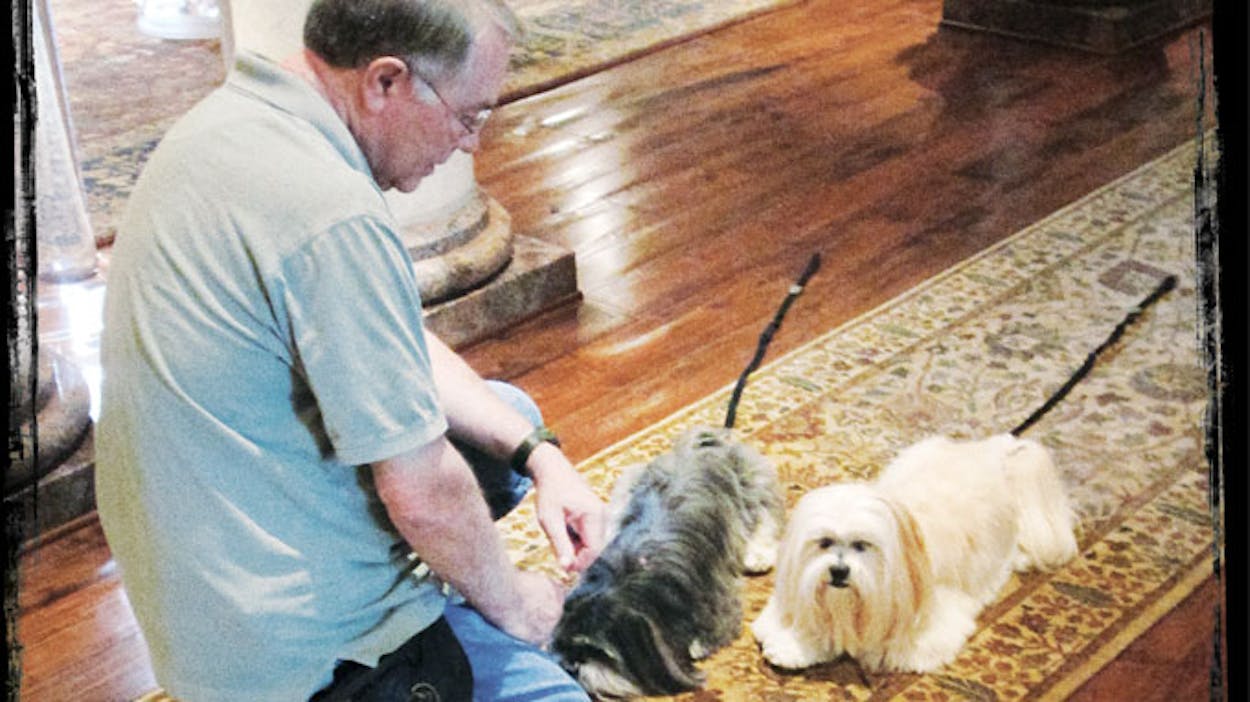Jim Burwell spends his days driving between River Oaks, Memorial, and West University with a fanny pack full of moist lamb loaf. The loaf, a two-pound roll that comes in a tightly packed tube like Jimmy Dean sausage, is among the more effective tools of his trade. Burwell is a dog trainer, and his unofficial specialty is handling wealthy pups—ones that split their days between three states, go to camp twice a week, and have agility courses in their upstairs ballrooms. The types of dogs, that is, that are unlikely to be impressed by pedestrian treats; fortunately for Burwell, most of them turn out to be slaves to the loaf. For a small bite, a dog will do almost anything.
Burwell is 67 years old, and during his 25 years as a trainer, he has made more-pliable companions out of Lieutenant Governor David Dewhurst’s Maltese, Heather; Roger Clemens’s two boxers, Ali and Rosie; and oil tycoon Lester Smith’s Lhasa apsos, Peaches and Coco. He trained a pup for the 1998 Wortham Theater Center production of Annie, as well as Radar, the weather dog for KPRC Channel 2. He taught a lab mix named Raven to detect when a young boy was going into diabetic shock from the scent of the boy’s saliva, and while volunteering for the Lone Star Search and Rescue Dog Association, he used a human tooth (given to him by a dentist) to train his own golden retriever, Angel, to search for missing people and corpses.
Burwell is not cheap. He typically charges $185 an hour. But that doesn’t mean he deals only with rich bitches. While popular among Houston’s dog-loving socialites, he insists that normal families are his “bread and butter” (of course, we’re talking about the kinds of normal families who can afford him in addition to their children’s piano and tennis lessons). As we drive from one client’s well-appointed home to another, he contends that when it comes to dogs, there is actually no difference between the haves and the haves-not-as-much. “At the end of the day, everybody puts their pants on the same way,” Burwell says. “Everyone has dog problems—it’s not like you’re exempt because you’re rich.”
Burwell’s first career was as a banker, but in 1988 he decided he wanted a job that allowed him to see more of his golden retriever at that time, Charlie. His reputation for really understanding dogs grew through word of mouth and, later, his popular advice website, PetiquetteDog.com, which contains a section called Videos to Watch With Your Dog.
That’s apparently something dog owners should consider doing. Burwell says that the key to a well-behaved dog, just like a well-behaved child, is individual attention. When working with a trio of three-month-old Brittany spaniels—Pumpkin, Oakley, and Scout—at the home of a high-powered lawyer and an anesthesiologist in Southside Place, Burwell took one pup out on a lead at a time, leaving the other two in their crates.
“Dogs don’t do well with emotional tension,” says Burwell, who has a quiet and calm presence. In general, rather than disciplining with a smack or a sharp and angry “No!” Burwell looks away and avoids petting or making eye contact. When little orange-and-white Scout tried to clamber into his lap, he used that very tactic, ignoring the dog until it settled by his feet first.
The key was to look away immediately. The most important thing to keep in mind when working with canines, Burwell explains, is that if you wait more than 1.5 seconds after an action to deliver a response, they will fail to associate it with that action. All the lamb loaf in the world can’t extend this window, and it accounts for why so many dog owners are met with confusion when they try to discipline their pets.
Sometimes ignoring a dog is the best thing you can do for it, a difficult task for someone accustomed to lavishing affection on an animal. But that would be the lesson at Burwell’s final stop of the day, in Tanglewood, just down the street from the home of former president George H. W. Bush. There we met Clancy, a black and white Tibetan terrier with a cute little topknot and severe separation anxiety. All day long he would follow closely on the heels of his socialite owner. “It’s like having a furry shadow,” she complained. “If we can somehow make him a good, balanced dog, I’d be so happy.” Burwell’s advice? Create a social distance that encourages the pup to be independent. Make your dog earn its praise and give it in moderation. It’s a costly lesson, and Houston’s most devoted dog owners clamor for slots on Burwell’s busy schedule to get it. Because Burwell’s real gift isn’t necessarily training dogs—sometimes it’s training owners. Behavioral change is priceless.








